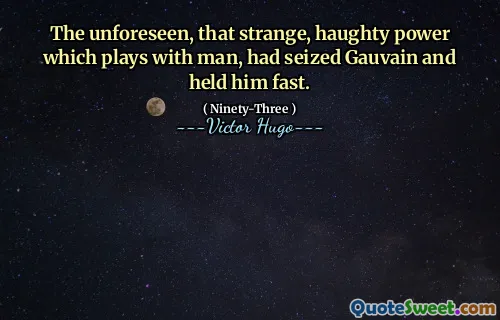Above the revolutionary absolute, there is the human absolute.
In Victor Hugo's book "Ninety-Three," the concept of the "human absolute" is presented as a higher moral standard that transcends political revolutions and ideologies. This idea suggests that while revolutions aim for change and justice, they can sometimes overlook the fundamental principles of humanity. The pursuit of absolute ideals can lead to conflict, but true progress is found in recognizing and valuing human dignity above all else.
Through this lens, Hugo critiques the extremities of revolutionary fervor, advocating for compassion and empathy in the face of societal upheaval. The human absolute, therefore, serves as a guiding principle that urges individuals and societies to prioritize kindness and understanding, ensuring that the outcomes of revolutions align with humanity's deeper ethical and emotional needs.






